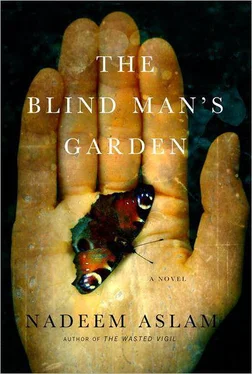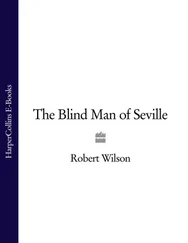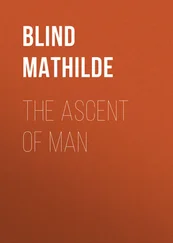Even though it is still night, he walks out of the house through the kitchen door, the bag hanging from his shoulder, the moon casting blades of light on the river’s surface. Going along the water he comes out to the road leading to Megiddo, and halfway along it he takes the narrow path which ends in the yellow flowers. He can smell them as he nears. It feels as though he hasn’t seen them for several months instead of several days. Above him the craters and canyons are clearly visible on the moon’s surface, and in the bluish light he walks through the flowers, still warm from the day’s heat, and on towards the low light-capped hills in the distance, and three-quarters of an hour later he is crouched in the dry bed of a spring, watching the group of dark figures in the distance. He wonders if they are Americans. They are fifty yards away from him across a wide band of gravel. Between them there is a stand of small dark bushes. He moves forwards on elbows, the bag resting in the small of his back. They are moving slowly across the slope of the hill and seem to be searching the network of caves. Looking for terrorists. And suddenly a group of figures emerges from one cave and they run and struggle with the searchers. Each one as angry as a snake in an eagle’s claws. Some of them fall to the ground and the dust blows in the air and the wind brings him their shouts along with Arabic words of praise for Allah, which the apprehended figures utter at each bit of pain and each restraining grip. The Americans, if they are Americans, are completely silent as though their words and sounds are incapable of travelling through the air of this land. Their existence here generates electricity that he can feel on his skin and for a fraction of a second he believes he sees the glittering eyes of a white man in the moonlight. But now he knows that the searchers are Pakistani soldiers because he hears them begin to talk in Urdu, Punjabi, Pashto and Hindko. The prisoners will be handed over to the Americans and the Pakistani army will collect the reward. The Arabs have probably just arrived from Afghanistan and were hoping to join up with their companions who have already escaped to this area. It is even possible that they were on their way to Akbar’s house. Three of them have now run away down the hill towards the valley of flowers and five soldiers go after them, raising dust that shines palely under the moon, passing within twenty feet of where he lies, and they turn and move far out on the slope until they are the smallest of figures in the blue light and then they disappear.
‘Get out of here, get out of here,’ he tells himself under his breath.
By the time he gets back to the house the darkness above him is splintering into light and it is almost dawn and a faint call to prayer is coming from the direction of Megiddo to the north of the house. He wonders if he should go to the mosque and try to glean information from the worshippers, and decides against it because someone could alert the Pakistani military or the Americans to his presence. He falls asleep in Akbar’s room, listening to the muezzin, having locked the door and dragged a table against it — listening to the muezzin and to his own whispers, ‘Get out of here, get out of here.’
*
Carrying the snow leopard cub inside his shirt, the American soldier steps across the international boundary line sometime around 3 a.m., leaving Afghanistan’s Paktika Province and entering South Waziristan. The cub’s small head sticks out from the top two undone buttons of the soldier’s kameez. He walks through the night that is full of the schemes of terrorists and the plots of generals, the mathematics of war. There is a chalky wind and he carries a rucksack on his back and there is a large Thuraya satellite phone in a holster around his waist. Another, smaller satellite phone is concealed in the pocket in the shorts he wears under his trousers, in case he has to relinquish the Thuraya.
A Special Forces soldier, he found the snow leopard during a raid at a house in the town named Megiddo, and among the things in his rucksack are six of the several dozen tins of cat food he has had shipped from the United States.
There are night-opening flowers on the cactuses. He walks through the moths that are feeding on them, fluttering audibly around him. These mostly barren hills are being used by terrorists to flee Afghanistan and he is alert as he walks. His younger brother was murdered by a freed prisoner back in January.
There is no name, but the first finger on each of the prisoner’s hands was missing.
Walking across an expanse of sand where the prevailing wind has produced corrugated wrinkles, like a broken staircase of white marble, he notes the angle at which he walks relative to the pattern, keeping it constant so as not to lose orientation. The maverick. He told the others in his team that he would be back in twenty-four hours, or would call them if he needs assistance. If he isn’t back within twenty-four hours they will begin to look for him.
From time to time he makes sure that the leopard is facing his chest because he knows the eyes can be seen from a mile away in the desert.
Loaded into the memories of both satellite phones are the photographs of the prisoner who killed his brother, taken when he was originally captured. He should never have been freed — he never revealed his name and that should have been indication enough that he was a hardened terrorist, most probably belonging to the upper echelons of al-Qaeda. He should have been taken to Cuba for complete and advanced interrogation. The proof of it being that he shot dead two Americans the instant he was released. A detailed investigation is being carried out into how such a shrewd and astute prisoner, who was clearly a threat to the United States and to peace in this region, was given his freedom.
But it is difficult to be sure. The innocent and the guilty both weep in the interrogation rooms, leaving wet spots on the material of the jumpsuits as they wipe large tears on their shoulders. ‘I swear to Allah on my heart and limbs …’ ‘I swear to Allah on my mother’s grave …’
He stops and looks around as he comes to a river, to make sure he is travelling in the right direction. Most rivers in South Waziristan flow from west to south, he knows, and he remembers his brother’s paranoia about crossing streams or rivers in Afghanistan, having heard stories about plastic Russian mines still flowing in the currents. But this is Pakistan.
There are American military bases in Germany, Japan, South Korea, Saudi Arabia, Kuwait, Bahrain, Albania, Bulgaria, Macedonia, Qatar, Oman, the United Arab Emirates, Hungary, Bosnia, Tajikistan, Croatia, Afghanistan, Kazakhstan, Uzbekistan, Georgia — a base in each vicinity, ready to mobilise and put down possible threats. And it is no longer a case of American happiness, American freedom, American interests, the American way of life. Now it is about the survival of America itself.
He is navigating by the stars as he walks, picking a new constellation every twenty minutes as the old one shifts direction with the earth’s rotation. Hercules. Ophiuchus. He wonders if among them there is a spirit or god or goddess that walks the battlefield, collecting the last words of the dying, enumerating every drop of spilled blood.
What were his brother’s last words?
Careful even when boisterous, as a Military Policeman his brother had never violated the rules, had in fact intervened one afternoon when an interrogator forgot himself during a session and made physical contact with the prisoner — grabbing the jumpsuit and shaking the kid. Most of the prisoners are so thin, small and undernourished that there is constant fear that one of them will die from the strictness of even the normal regime. He has yet to shed a tear over his brother’s murder, willing the fact of the departure out of his mind as best he can, existing in the unexamined haze, stopping himself whenever he hears himself humming the song his brother had loved, taught to him by their mother.
Читать дальше












